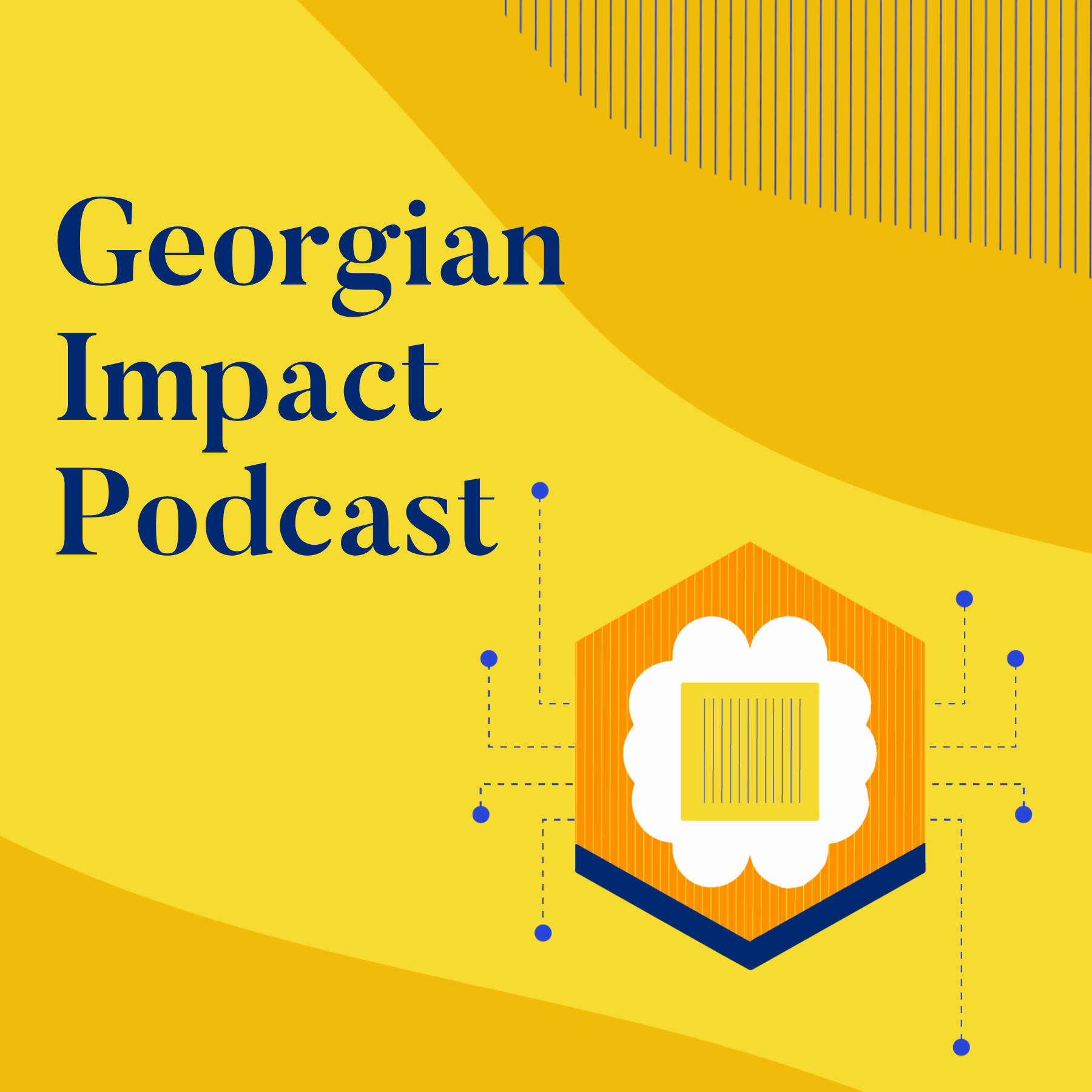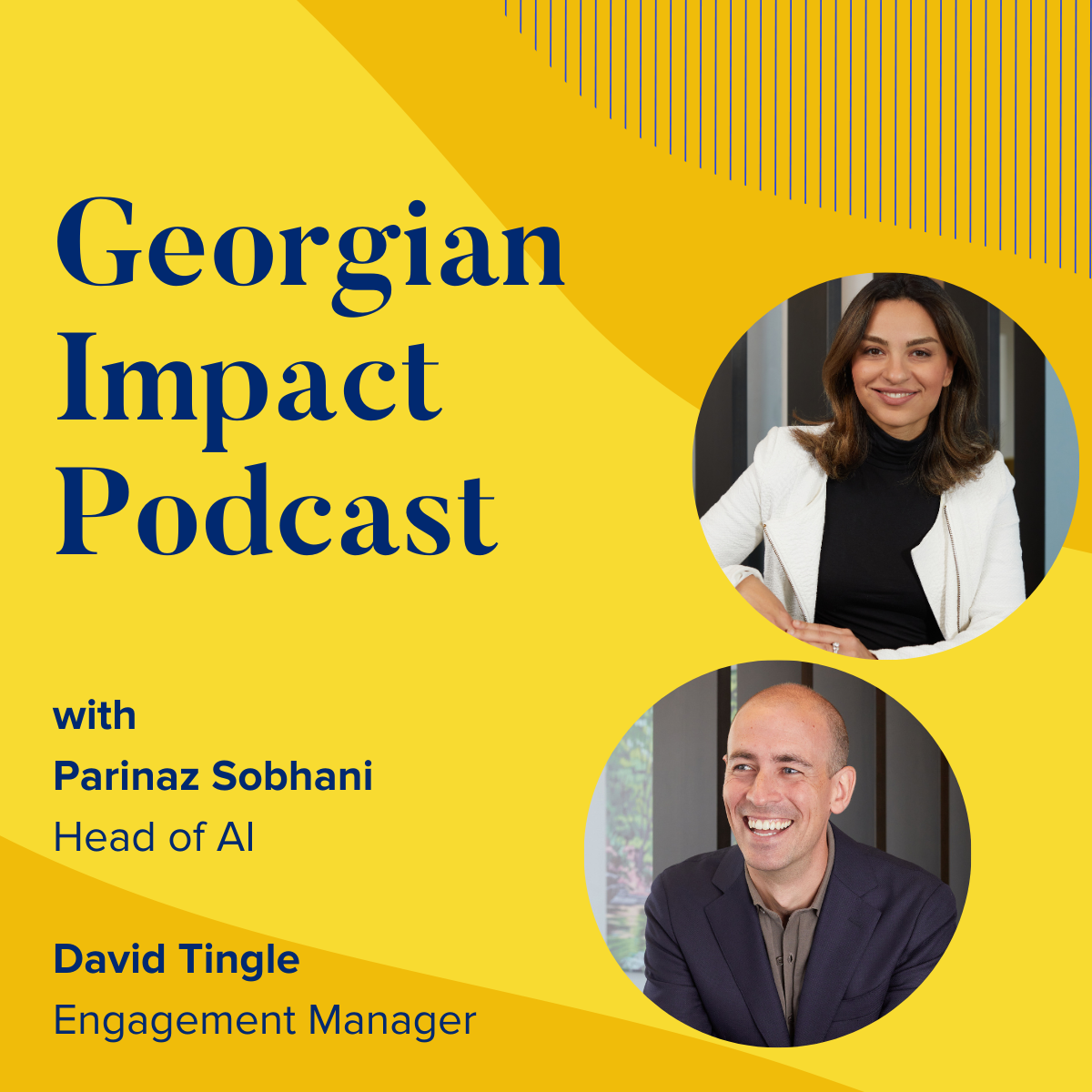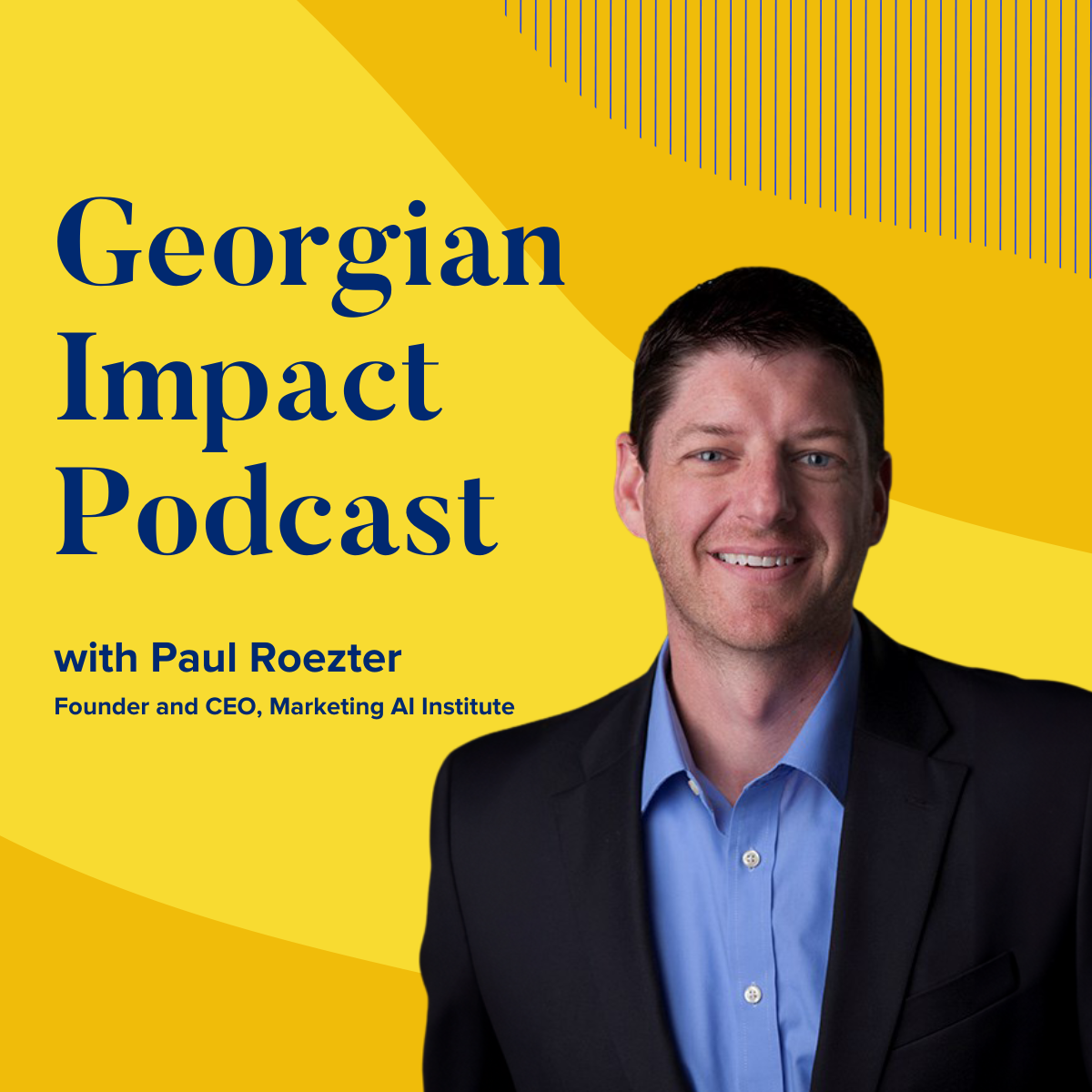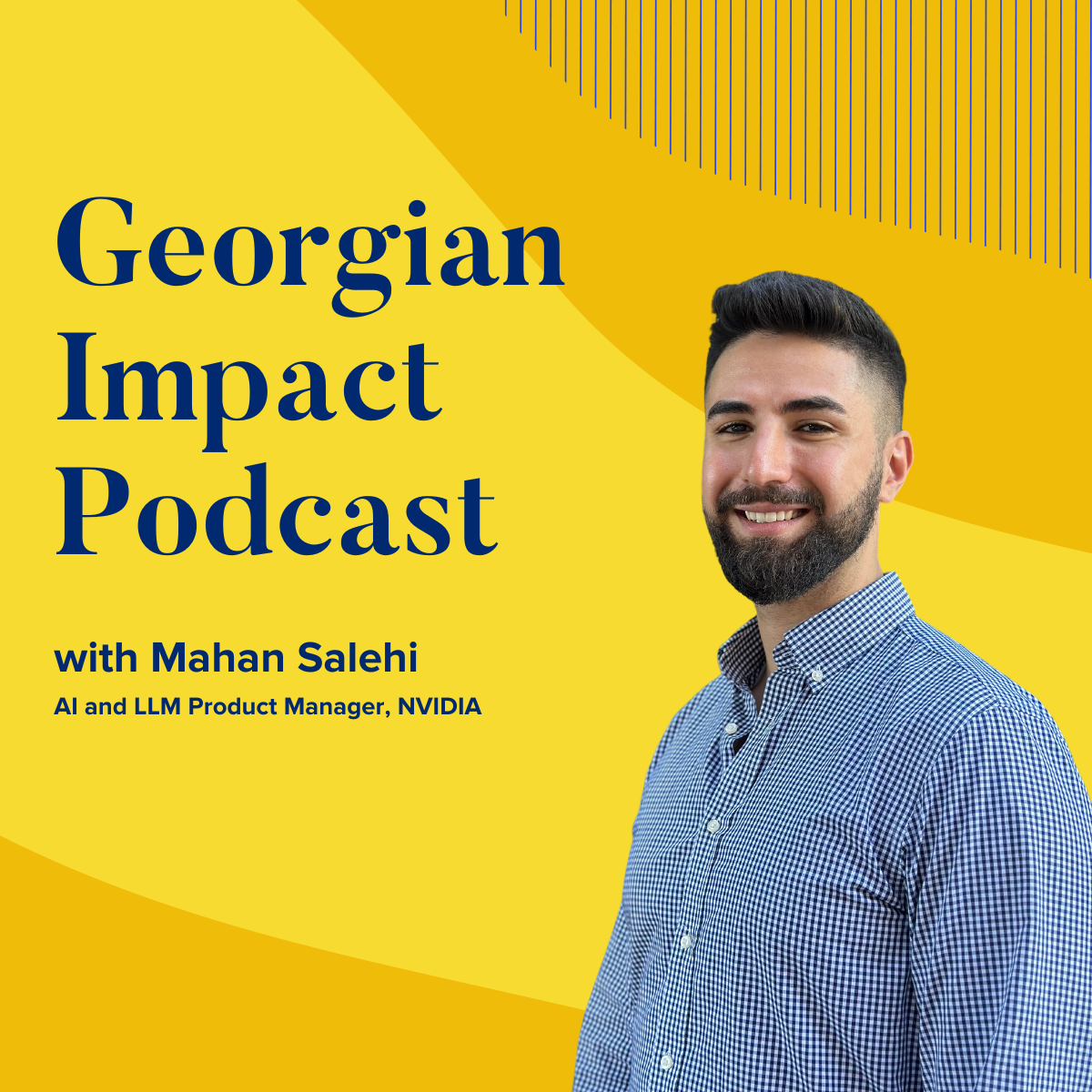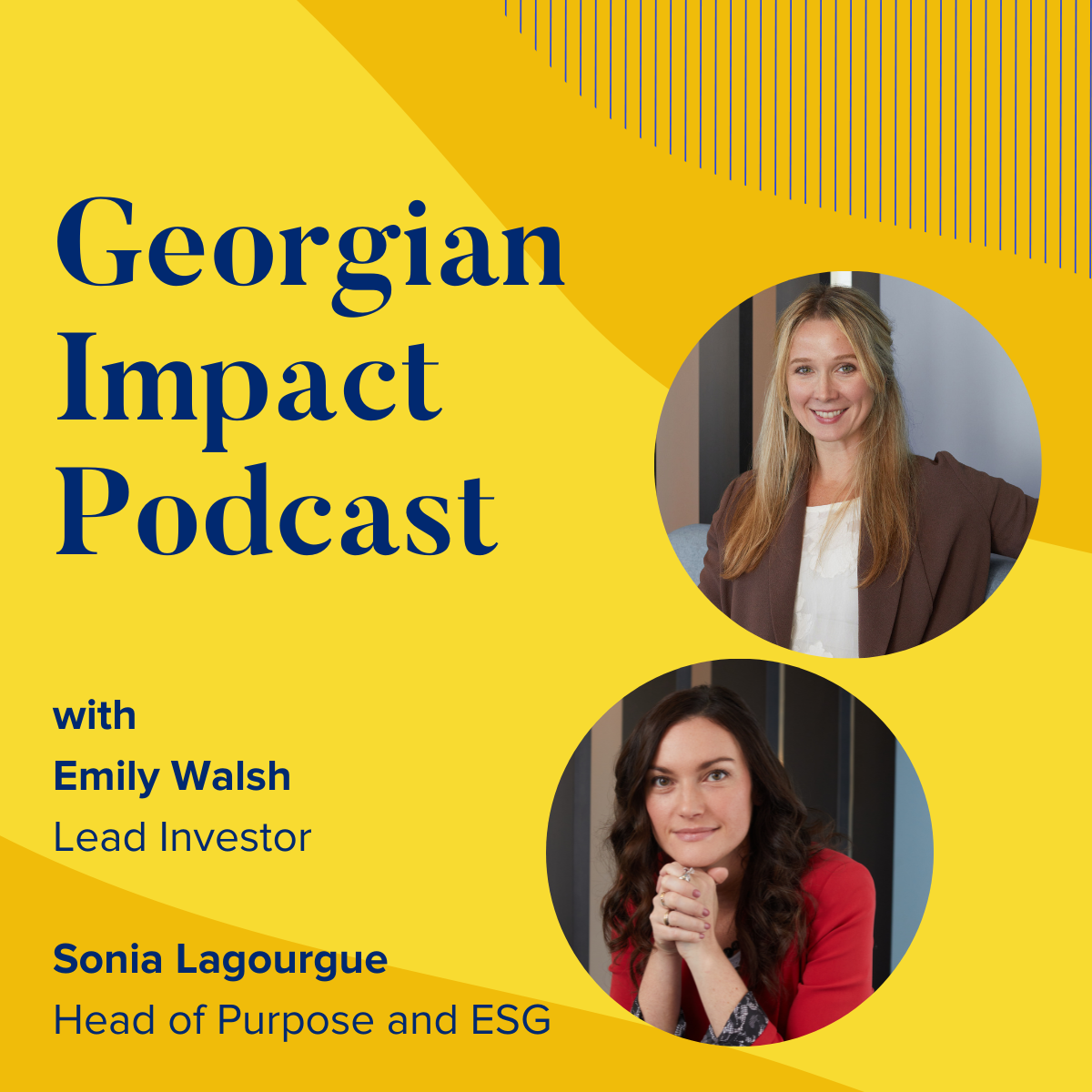Episode 85: AI, What Is It Good For with Jana Eggers
- 0.5
- 1
- 1.25
- 1.5
- 1.75
- 2
So I look today is it school and that tool can be use to help us build relationships with customers so I know more about what they need. I'm not excited about relations that go into that. I'm excited about the CEO of a company whose only imagine what's that? You say? Well if you want to match buyers and sellers or match jobs to people you named it tell about Jaden AI Logics helps companies connect to Data Network of explicit and inferred connections across all that data. So you can actually do something meaningful today on the show Jen and I are going to be talking about the realities of artificial intelligence. What is actually good for where to use it and how to run a successful AI project. It's going to be a great discussion. So stick around I'm Jon preall welcome to the Georgian impact podcast.
China going to be windy today. How you doing? It's great to be with you as well. And I'm doing wonderful. Thank you different weather is eCommerce or Healthcare Financial Services give different models for each or does that come from your customers? How do you begin to get that vertical slice as a solution built that such a great question are vertical slices more about the integration of the data. So what tools are using you can think of is all terminology but a self building expert system. So you have experts your expertise a lot of Enterprises in their data. So how do we extract that expertise out of that data and the Machine to start responding so that you can then Focus again?
It's been written up in a couple articles. It's one of your case studies around Procter & Gamble and is it is Olay skin advisor? What kind of data do you bring to the table? And desert where you working at the solution with them? Did they say look we need more we need additional third-party gauges assist. I got to go scrape other sites. How does you got a bill the solution set for that thinking about the date of the sky to come in? Honestly. I really encourage companies start with your date of birth and you understand that better than you understand energy in a great example the primary data there is so most companies think they don't actually need to do good quality and the gray
Interesting, you might use the same machine learning algorithm for old ladies, you might use for I don't know what Government Solutions you're generating these knowledge grass talk to me a little bit more about how that happens to us. What we're doing is trying to extract knowledge so advisor that data could be about my products and how they relate or we work with the intelligence Community. It should be about events that happened around the world is related to places the people that governments that are things like that. That's what we're doing is we're taking and data we're seeing each other and we're building a big Knowledge Graph out of an Enterprise data problem.
Putting in a hospital most important as you say it's all about all about the relationships of the data and I like the kind of the Venn diagram the visual Venn diagram of God of the date of the tools in the business actual you mentioned that it seems like your company should have enough data to do some AI projects going on. So what what do you think is holding people back? Is it the data or they're just not getting around to focusing on doing the right type of AI that they can do it. One of the challenges is organization wise actually it's been a year now that I titled it's the organization stupid and the reason why I came up with that as I read an article that was all about somebody putting some
Play some the title was something like how we built our inside engine and I thought it was and when I read it the entire article is about organization. And that's when I had my face. That's it. It's the organization stupid. And so I believe that's really what's holding. Most people buy you some data or use the excuse. We don't have that. You have the business problems. Your issue is organization. And in the reason why organization is an issue is because
AI does across the silos and that's the biggest challenge I like the point of leadership in terms of AI is the Panacea yet. And and I guess I'm going to make the reference you talked about Kasparov blowing a deep blue game and it was a bug in the AI penis I think is the question.
I think it's more ready than we give it credit for and because we do see some of the problems that come out and some of them are quite sure, you know, Amazon recommends, you know, Amazon and Netflix are really just trying to get you to that next something. They don't really care what the next something where is most companies really care what the P&G chairs not to recommend you by different different says they're actually talking about a different problem or something different than a Procter & Gamble is or a Netflix. And so that's what I mean by that.
Tools are your AI and your data and so. That's where I'd say. It's much more capable. People are just trying to read why a technology for their problem. And that's where they run into problems from an Amazon issues loyalty to a brand versus a transactional system perhaps so there's more opportunities across different Industries. Where would your kind of more rights than others?
I want to be really clear about that digital transformation doesn't mean what does it mean? Where does it fit into the into our prophecy? So what I think is exciting as there's been over the last nine months and people that are real real transformation is and if you don't look at the Google Trends search on actually digital transformation is growing at a faster pace. So I wish we had seen that and so that's what I think is most exciting is that people are starting to really think differently of how is digital going to try and they have a good analogy to how did mobile transfer my business?
Let's let's get into little bit of the basics of your the basics for a successful AI project and I thought about this a lot a cool thing. I read was it you were telling Executives that artificial intelligence is only the rocket science of a bigger Space Program. Tell me more about what you mean by that always said rocket science actually isn't that complicated really complicated is a space program. And so if you're looking at it and say, oh my gosh, you're actually going to because you don't know what your overall objective is. So I'd fit that into my framework again of you know, my space program is my business results.
AI is a critical component, but I need to know where that Rockets going what it's going to do with the rest of everything else and it's down to a lot of details there. It isn't a great place to do a lot of small tasks to really get the power. Otherwise, you're just going to continue to kill your AI projects the power and AI is a larger scope what makes it right then and now that you've got to stop phone calls and defining and repeating a Clear Vision talk to me more than about how important vision is here and getting this right getting your space program right vision point is there's two pecan pie.
Intelligence is defined as the ability to learn and learning continuous Improvement and most people right now that I see her are not understanding what learning means. So how do we turn ourselves into learning words, you know, if I'm just trying to replicate and do marginally better on my statistics. I would just use another analytics approach if I might change I might realize that there's an opportunity that I didn't either and if I if I don't know how I'm going to react to those learnings that's where the problem comes in. So if I'm learning from customers and I'm learning that they do want to buy five.
That's how they think about. I want one in the morning and the afternoon in the evening. If I really have to say no, we would never write. So so again intelligence me ability to apply learning learning means. I've got to change and his organization weerstra Church in DeBary deterministic and predictable indeed apis and measurements along the way are the critical next set of steps to kind of get there. Yes. I think that's where you have to back up and and say I may have developed these kpi, but were they really the right one for my ejecting? My objective really is a great relationship with customers.
Right. I may have the wrong KP I sat there and I have to be willing to learn that last piece and you mentioned early on that. Every recommendation is returned to a y and that comes back to clear transparency and trust and I love to get you a sense of what you what your thoughts are on that in. My mind is a range every States could be very high could be a credit report or medical report or could be low stakes. You just bought the Lamborghini. I think you should be buying a toaster and she get that wrong will probably okay. So give me more more kind of what you mean when you're thinking about this returning why and how that's so important to you.
It should be right when we're working in the intelligence community's some of those dates to be very very high point them in the right direction if I make a mistake and in something that's consumer-facing and low States. It's not directly that guy that said it doesn't take my relationship with my customer and if they start to not trust me because they're like, oh you don't understand me. Why are you and I one of the biggest things that happened. I just bought a toaster from them. Why are they telling me to look at more toasters? I'm not I had there's a great one online recently and she will exceed Aficionado. I just needed a toilet seat.
Republicans works really well for books because I'm going to buy a lot of different books, but I'm not going to buy a lot of toilet seats and should not be caught in terms of really analyzing District Dayton transaction that would our repeat purchases sources that repeat purchases should not be caught as part of your Learning System. The question is did I have bigger lovers other places and so that's what you have to think about it again when you talk about which AI is right for me. It's really understanding what it's optimized for an input they fix that and so they sell other things if I did buy toilet seat, you know, maybe I'm I'm redoing my bathroom and I should be showing me faucets.
Or maybe they should be showing me glue for the next thing that breaks so they can solve that problem. What we don't know is what other problems are solved, right? They may have something with a bigger opportunity for them. They know their business and that's exactly the kind of learning things I can do which ones do I trade off to actually have the best reward for me. So I got to team questions and I was going to go into the data science team question, but I'm not I'm going to actually ask you about the non data science team question where you said don't just leave it to the engineer's it can't be a black box any product owners and SSS social scientist in a lawyer's. So tell me a little more about your thoughts around that space.
Yeah, it is really very much a sport and and what worries me and I don't see this. This has really changed over the last year and a half people are not treating it as a Seal Team Six operation have to be integrated. So, you know, first of all you have that product you do need to think about that. There's a lot of Ethics involved.
What is my rescue know your your point about how risky? Is it to offer me another toaster? I'll give you an example. That's come up multiple times where people said A friend of mine died. And I didn't know because you didn't show it to me and my new right and so do we have ethics involved in what what they're trying to do near your Twitter's in your Facebook and it happens on both of them to not just get you to click on something but to engage you because people said, how is it possible that I didn't know that my friend from high school passed away. Should you see a strong correlation in between doing the right job on transparency weather is around the transactions and why am recommending a toilet seat or glue?
And trust and that relationship that a company whether it's an Amazon trying to sell you 5 eye creams or Procter & Gamble selling you the right eye care how this is all come down to the linkage between transparency entrust. When does it matter and I think it goes even more specific. When does it matter for Amazon? What are the product expert cuz I don't expect that right? So that's that part of that my expectations. I expect them to be more right just sit whenever I have to buy it, I we buy an Amazon a lot. But if I need to buy something from a particular company, I go to the company's website and see what current products are. So I want to buy Samsung TV Samsung.
What's a hundred on Amazon? You're two years three years old for you. I want the latest to go to the Samsung website get the model. I want and then decide if I'm going to buy it on Amazon or somewhere else, but I have to still go to the brain and I don't think a lot of people do that than they're getting junk from Amazon exactly right that we make those choices, but I do think they're working on transparency. They'll stay you know, what they say about this also bought that because people bought it together. It ain't no sense at all. Because how many times do you have things in your basket? They're completely unrelated. But if you posted on Facebook, I'm renovating my house. And then Amazon said, hey, you're renovating your house hears all the toilet teacher going to need I think that the transparency often cross.
Is that creepy line, which we have to be very careful about sure that your customers expect you to know.
And then I would also say that one of the things that we found out that surprised 18 has talked about this is we were surprised how much even when somebody went in and answered a question how much better they felt when we answered back to them what they had just answered you side fine lines and wrinkles are your concern about your skin and I'm at going back to you when I give you the product recommendations at this is for Fine Lines people. Actually. I know I just answered that question, but I'm really glad to know that you applied it. That's a perfect example of transmission perfect example of ux design it with the product manager is dealing not just was coming out of the engineering team and it's good that everybody works together on that one. Thank you so much. I enjoyed chatting with you.
Thanks for listening. If you like what we do it, we'd appreciate your telling other people about the show better yet. Give us a 5-star rating on iTunes or write a review doing so a really help ensure the more people can find us and if you haven't already, please subscribe to the impact podcast on iTunes, SoundCloud or have you go to find your podcast.
